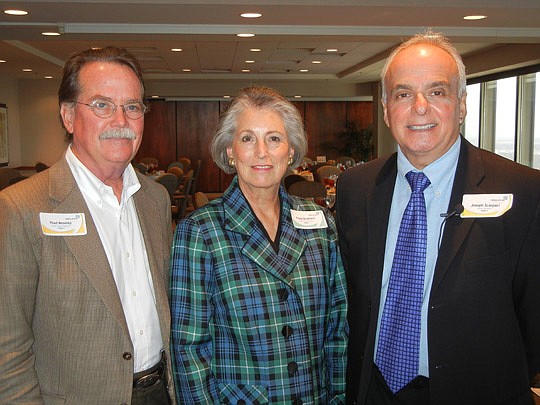
Joseph Scarpaci, executive director of the Center for the Study of Cuban Culture and Economy, shared his insights into the economy, business and trade of the island nation 90 miles south of Florida run by the totalitarian government of brothers Fidel and Raul Castro.
Scarpaci met with about 100 members and guests at the World Affairs Council of Jacksonville on Tuesday at The River Club Downtown. His topic was "Cuba: Economics, Business and Trade … What's the Future?"
Scarpaci said major changes in the Republic of Cuba aren't expected during the reign of Fidel, 86, and, Raul, 81.
"My sense is nothing is going to happen until either one or the other is out of the picture," he said.
Once that happens, he said change can take place, with infrastructure one of the greatest needs.
"Cuba is a '49 Plymouth running on its rims," he said.
The Center for the Study of Cuban Culture & Economy is based in Blacksburg, Va. Scarpaci also is associate professor of marketing at the West Liberty University Gary E. West College of Business in West Liberty, W.Va.
Scarpaci, the author of three books and dozens of articles about Cuba, also referred to the National Geographic cover about the country.
A fact list from National Geographic summarizes Cuba's history. In brief, Fidel Castro took over the country in 1959 and in 1961 established the first communist state in the Western Hemisphere. Since then, more than a million Cubans have moved to the U.S.
Cuba's economy crashed after Cuba was abandoned by the former Soviet Union and Eastern European trading partners in the early 1990s, and food and energy were tightly rationed. The U.S. has maintained a trade embargo for 50 years.
In February 2008, Fidel Castro resigned as Cuba's president, ending 49 years of uninterrupted rule, and named Raul, as successor.
Cuba has a population of almost 11.3 million and a per capita gross domestic product of $2,700 in U.S. dollars.
Scarpaci spoke at the council's last Global Business Luncheon of 2012. The first in 2013 is scheduled Jan. 8, featuring Alice Rivlin about "The Future of Health Care Spending." Rivlin is a former vice chair of the Federal Reserve Board and is a visiting professor at the Georgetown University Public Policy Institute.
The council operates on a fiscal year. Three luncheons are planned through March.
The council also sponsors Global Issues Evenings at the University of North Florida Herbert University Center. Rivlin is scheduled to talk about "The Current Outlook for the Economy" at 7 p.m. Jan. 8 at UNF.
The next evening event is scheduled Tuesday, featuring Virgin Galactic spacecraft designer Burt Rutan to talk about "Inspiration for Innovation and the New Race for Space."
For information about the World Affairs Council, visit www.worldaffairsjax.org.
@MathisKb
(904) 356-2466